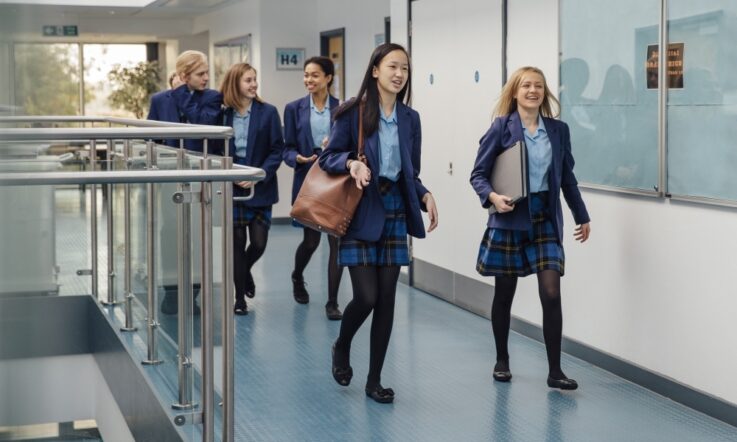Planning ahead to meet the professional learning needs of staff to improve teaching effectiveness in your school is an important aspect of a principal’s work. But, what happens when these plans get overtaken by events?
At St John's Catholic Parish Primary School in Melbourne’s north east, a focus on wellbeing and resilience is woven through the school’s philosophy and practices. But 2020 brought unexpected challenges, and required a quick pivot to new strategies.
Existing support structures meant the leadership team were able to identify the change in staff needs early on. As Melbourne went into lockdown, the team continued to facilitate their scheduled staff meetings. During these meetings teachers were able to complete wellbeing surveys; the Leadership Team reviewed the results and used this data to plan meetings to meet both the wellbeing and professional learning needs at the time, with a focus on technology.
Additionally, the Leadership Team made contact with staff individually through phone calls and Google Meets to support their wellbeing and their ability to provide quality teaching, in an uncertain and changing teaching and learning environment.
‘We knew from our regular check-ins with staff that our teachers were feeling overwhelmed. As a leadership team, we discussed how we could best support them,’ Principal Maureen Stella tells Teacher.
That meant a change in plans. ‘We decided to put their existing professional learning targets on hold, and instead, addressed the urgent challenges: we provided supportive wellbeing, tech and professional practice learning opportunities to equip teachers with the skills and strategies they needed to do their jobs well.’
Stella and Deputy Principal and Wellbeing Leader Elizabeth Whiting explain the wellbeing response that the Leadership Team took was based on the professional reading Natural Disasters and Pandemics (Cahill et al., 2020). ‘Through this approach, the teachers’ understanding of the impact and trauma experienced by students, families and staff was enhanced and enabled them to provide supportive social and emotional learning, in their capacity as teachers. Examples include, maintaining routines, staying connected and having positive interactions (albeit often online) with students and staff, self-care and positive coping strategies. Teachers collected ongoing data via Google forms and anecdotal records, as well as communication with parents, to ensure our students’ social and emotional needs were being monitored.’
Leadership actively listened to staff and a need for change in routine became evident for students and staff. In response to this need, the Student Wellbeing Team at St John's planned a Be You Better Buddies Day, with the theme of gratitude. ‘The main focus of the day was for all students to build positive relationships across the school, enhancing their sense of belonging and connectedness. The day celebrated our Essential Workers as Superheroes with a lens on the values of “respect” and “caring for others”,’ Stella and Whiting add.
The school worked with the National Excellence in School Leadership Institute (NESLI) – Stella and Whiting were both participants in NESLI programs. Dr Janet Smith, Director of Programs at NESLI, says the last 18 months have been particularly challenging for school leaders across Australia.
‘The pandemic has forced significant change in the way educators teach, lead and adapt, and this has required incredible levels of resilience. We know that school leaders often take on the emotional labour of caring for staff and students, which takes a very real toll on their wellbeing and energy levels.’
Smith says investing in the wellbeing and resilience of educators not only allows teachers and school leaders to better manage the challenges of their jobs, it also benefits the students and broader school community.
Whiting agrees, adding that educators must first look after their own wellbeing in order to support their students. ‘You need to look after your wellbeing to function in your role at school, and to have a healthy balance at home.
‘It’s about building a great culture – we all contribute. As school leaders, we are conscious to model reflective practice, growth mindset and gratitude. And we see this flowing through to our students – for example, a number of children recently wrote letters of thanks to our school leaders for their new playground.’
Smith says, in addition to helping staff through challenging times (such as the lockdown and ongoing impact of the pandemic on schooling) there’s a longer-term benefit to supporting health and wellbeing. ‘Personal and professional resilience is not only about strength through adversity – particularly during a pandemic – but the ability to grow and adapt as a result of disruption.’
Wellbeing and resilience tips for school leaders
Here, Maureen Stella and Elizabeth Whiting provide their tips for fellow school leaders:
- Remember to step ‘off the dancefloor’ and ‘up to the balcony’ to take a holistic view of your current environment and challenges;
- Build your own professional network and lean on them when you need advice, a different perspective, or a trusted sounding board;
- Conduct a ‘temperature check’ survey to get a sense of key wellbeing and resilience issues among staff and parents;
- Utilise the Community Conversations process, using the Melbourne Archdiocese Catholic Schools (MACS) framework, based on the Family School Partnership initiative (2010–2013), in partnership with Dr George Otero from the Centre for Relational Learning, New Mexico. This process provides for intentional and inclusive conversations between staff, students and parents;
- Look beyond the school to identify opportunities to build a sense of community – for example, St John’s students sent personalised Thank You cards to the Austin Hospital, Heidelberg Victoria, which were distributed throughout the hospital, especially to the speciality areas that dealt with COVID-19.
- Consider what you can do to support other leaders within or beyond your school.
References
Cahill, H., Dadvand, B., Shlezinger, K., Romei, K., & Farrelly, A. (2020). Natural disasters and pandemics: Supporting student and teacher wellbeing post emergency. Melbourne Graduate School of Education.
Does your school have a staff wellbeing policy? What support networks and programs are in place for staff? What impact does this have on student wellbeing?
As a school leader, do you regularly set time aside to focus on your own health and wellbeing? What support networks do you have in place?
Wellbeing and resilience are central themes in this year’s Australian Schools Women’s Leadership Summit from NESLI in partnership with Women & Leadership Australia. The online event is for women leaders at all levels in the schools sector and takes place on Friday, June 4.



